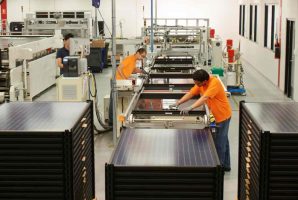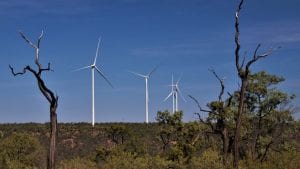Major new transmission network projects are now in doubt after the Australian Energy Market Commission formally rejected a request from network companies to allow for increased early revenues from key network upgrades.
The decision could potentially kill off plans to build major new network links identified in the Australian Energy Market Operator’s Integrated System Plan, considered crucial for further investment in wind and solar projects and the transition to a renewables-dominated grid.
Network companies had been hoping to front-end revenues to aid in securing finance for the network projects. Transgrid and ElectraNet said was necessary to ensure finance could be secured.
The two companies are developing the proposed $2.4 billion Project EnergyConnect providing a second link for South Australia, this time to New South Wales. The 900km transmission link will have capacity for 800MW and is seen as crucial to unlock major wind and solar projects in both states.
The interconnector project had been identified as a key project in AEMO’s Integrated System Plan and would serve as an expansion of network capacity necessary to facilitate additional uptake of renewable energy supplies within both South Australia and New South Wales.
But the AEMC has denied the rule change request, reaffirming a draft determination published in February and saying that the rules were unnecessary, and that it did not believe there were any barriers to companies like Transgrid and Electranet securing the necessary finance.
But this was immediately rejected by Transgrid, which said Project EnergyConnect was now in doubt and warned the flow on effect could impact other major transmission projects, including Humelink that will connect Snowy 2.0, and various renewable energy zone proposals in NSW.
It said the company’s board had concluded that the Project EnergyConnect was “not financeable under the current rules” and may not proceed as planned.
“We are disappointed with the AEMC’s decision as our Board has concluded the major projects are not financeable under the current rules because the projects would be rated sub-investment grade and not meet the AER’s own rate-of-return requirements,” a Transgrid spokesperson said.
“This is a significant impediment to making the projects investable and is relevant to EnergyConnect, HumeLink and other major projects in the National Electricity Market.”
“The delivery of the projects identified in Australian Energy Market Operator’s Integrated System Plan and the NSW Government’s Transmission Infrastructure Strategy is the best way to provide Australian customers with lower cost and reliable electricity and to ensure the transition to cleaner energy which is already underway.
“While the AEMC has highlighted the cost of delivering major new infrastructure in publishing its decision, it has not given sufficient acknowledgment to the significant customer benefits which flow from the construction of projects like EnergyConnect, HumeLink and the Central West Orana Renewable Energy Zone (REZ),” the spokesperson added.
In a submission to the AEMC made in response to the draft determination on the rule change request, Transgrid had said that it thought that the AEMC and its consultant Cambridge Economic Policy Associates had misunderstood the nature of the market for finance.
“We disagree with a number of the conclusions contained in the AEMC’s draft rule determination, in part because of the assessment approach adopted by the AEMC, but also because of its reliance on an inaccurate understanding of capital markets by its consultant,” Transgrid told the AEMC.
In its decision, the AEMC said that it also believed that changing the rules to allow increased early revenues in the years immediately after the project was completed would disadvantage consumers who will be ultimately lumped with higher short-term costs.
“The Commission has found the current rules do not prevent these projects attracting finance,” the statement says. “It also found the changes suggested by TransGrid and ElectraNet would have significant downsides for consumers.”
In its determination, the AEMC said that allowing for advanced revenues would represent an “intergenerational wealth transfer” that would not be in the interest of consumers.
“The intergenerational wealth transfer caused by the proposed changes to the rules would be unlikely to be in the long-term interests of consumers, particularly given that current consumers would be paying for benefits enjoyed by future consumers,” the AEMC’s determination says.
In its own response, Transgrid suggested that the EnergyConnect may now no longer proceed, with the company’s board concluding that the project was “not financeable under the current rules”.
A spokesperson for Transgrid also suggested that AEMC’s decision to refuse the changes would have flow-on effects for other major Integrated System Plan projects, including HumeLink, which is intended to connect to the Snowy 2.0 expansion and Renewable Energy Zones in southern New South Wales.
“We are disappointed with the AEMC’s decision as our Board has concluded the major projects are not financeable under the current rules because the projects would be rated sub-investment grade and not meet the AER’s own rate-of-return requirements,” a Transgrid spokesperson said. “This is a significant impediment to making the projects investable and is relevant to EnergyConnect, HumeLink and other major projects in the National Electricity Market.”
“The delivery of the projects identified in Australian Energy Market Operator’s Integrated System Plan and the NSW Government’s Transmission Infrastructure Strategy is the best way to provide Australian customers with lower cost and reliable electricity and to ensure the transition to cleaner energy which is already underway.”
“While the AEMC has highlighted the cost of delivering major new infrastructure in publishing its decision, it has not given sufficient acknowledgment to the significant customer benefits which flow from the construction of projects like EnergyConnect, HumeLink and the Central West Orana Renewable Energy Zone (REZ),” the spokesperson added.
In a submission to the AEMC made in response to the draft determination on the rule change request, Transgrid has said that it thought that the AEMC and its consultant Cambridge Economic Policy Associates had misunderstood the nature of the market for finance.
“We disagree with a number of the conclusions contained in the AEMC’s draft rule determination, in part because of the assessment approach adopted by the AEMC, but also because of its reliance on an inaccurate understanding of capital markets by its consultant,” Transgrid told the AEMC.
In its final determination, the AEMC noted that the process of assessing the rule change requests had flagged a number of significant issues with wider ramifications.
This included recognition that major transmission network operators had an effective monopoly on the development of the network upgrades identified in AEMO’s Integrated System Plan – but with no obligation to actually build them.
The AEMC said that it would instigate a wider review of arrangements to support the construction of new network infrastructure and to address issues of market power and financeability.
“In light of these issues and other work being carried out by the AER and jurisdictions in respect of large transmission projects, the Commission intends to commence a broader review, together with the other market bodies, to consider options to support the timely and efficient delivery of large transmission projects that are in the long-term interests of consumers, recognising that the nature of transmission investment is invariably changing,” the AEMC said.









